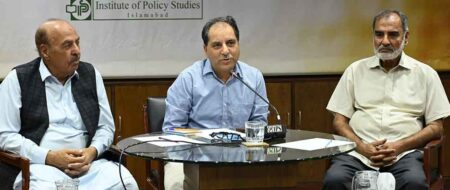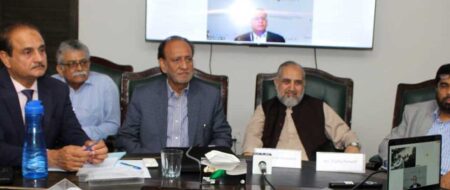Nuclear Security: Trends and Approaches
A seminar was organized at the Institute of Policy Studies Islamabad.Seminar, while taking into account the background of the summit, considered the challenges at global as well as regional levels and discussed options for Pakistan. Professor Dr. Zafar Iqbal Cheema, a leading expert on nuclear proliferation and Air Commodore ® Ghulam Mujaddid, Head of Strategic and Nuclear Studies Department at National Defence University were the key presenters while Senator Mushahid Hussain Syed chaired the session.
The “2012 Seoul Nuclear Security Summit”, being held on March 26- 27, 2012 is likely to be the largest summit in the security field with participation from more than 53 heads and representative of states/governments and international organizations. Summit participants would deliberate upon international cooperative measures to protect nuclear materials and facilities from terrorist groups.
In this context, a seminar was organized at the Institute of Policy Studies Islamabad.Seminar, while taking into account the background of the summit, considered the challenges at global as well as regional levels and discussed options for Pakistan. Professor Dr. Zafar Iqbal Cheema, a leading expert on nuclear proliferation and Air Commodore ® Ghulam Mujaddid, Head of Strategic and Nuclear Studies Department at National Defence University were the key presenters while Senator Mushahid Hussain Syed chaired the session.
Nuclear security is the concern of every nation using nuclear technology in any form or application. Nuclear security is based on achievement of effective detection and prevention of theft, sabotage, unauthorized access, illegal transfer or other malicious acts involving unauthorized usage of nuclear material, radioactive substances or associated facilities.
 |
 |
This perspective presupposes that all societies are equally prone to nuclear security risks and that there are no racial, civilizational or even technological superiorities with any particular nation or a group of nations for single handedly eliminating nuclear security risks. Nuclear security is essentially a collective responsibility of the comity of states. Nuclear security is a technical issue, but unfortunately it is being handled in a political manner. Under the garb of nuclear security, a campaign is underway to perpetualise nuclear asymmetries by denying even playing field to especially those countries which are at the lower end of the ladder of development of nuclear technologies.
Concept of nuclear security underscores the responsibility of every state for security and safety of its nuclear materials, machines, structures and related knowledge and expertise. Nuclear Nonproliferation Treaty (NPT) makes all parties to the treaty responsible for implementing nuclear security related regimes. However, NPT does not explicitly deals with preventing non-state actors from acquiring nuclear material or technology. Nuclear Non-Proliferation Regime also suffers from capacity and capability inadequacies. Mushrooming of dual application machines and materials makes the possibility of erecting effective firewalls against their misuse a technological nightmare.
After 9/11, hype of such likely misusages was created to propagate a perception about dooms day scenario, whereby a terrorist entity acquires the capability of delivering a nuclear weapon. Though there is no denying the fact that state level lapses could lead to access by a non-state entity to a „dirty bomb‟ level expertise, the fear has been overplayed to use this concern as a political tool. Concerns of nuclear security are based on chances of theft of material, sabotage, unauthorized use of nuclear weapons,insider-outsider collaboration etc. This has led to adoption of UNSC resolutions, especially 1540, and other formal and informal arrangements.
President Obama convened the first nuclear security summit on 12-13, April 2010 in Washington; 47 countries participated; out of them 38 were the heads of the states including the Prime minister of Pakistan. All states operating nuclear reactors were invited, focus of the summit was to find out ways and means to secure reactor related machines and materials from falling into unauthorized hands. It was the first summit of its kind to broadly address nuclear security. A futuristic approach was taken to minimize the dependence of nuclear applications on weapon grade fissile materials and to convert them to low enriched nuclear fuels in a phased programme. Another a good step was an agreement over destruction of surplus Plutonium stocks held by the US and Russia. Held on the heels of START III and the US Nuclear Posture Review of 2010, the summit‟s purely security related technical perspective was overshadowed by the narratives associated with nuclear weapons.
 |
 |
Moreover, beside security related issues, the event was used to ridicule Iran for its nuclear programme. Iran responded by holding a nuclear security summit in Tehran under the banner: “Nuclear Weapons for none; Nuclear power for all”. Hence Iran presented an alternative narrative for total nuclear disarmament, as envisaged by Article VI of the NPT, through a mechanism similar to the CWC and BWC. Even though total elimination of nuclear weapons would not eliminate the man made or natural calamity related risks associated with nuclear power plants.
While discussing the „Regional Trends of Nuclear Security‟ it was opined that Pakistan‟s nuclear security architecture is very secure. It has a robust nuclear command and control system. Pakistan‟s nuclear programme is transparent, that is why Pakistan is more liberal to give briefings to international experts regarding its nuclear weapons program. On the contrary, India does not arrange similar briefings for foreign experts. There is a misperception that developing countries have problems with their command and control systems.
It is amazing that countries which have had major nuclear accidents like Japan, USSR and US are considered much more secure than India and Pakistan. Also India with a poorer safety and security record is perceived to be better than Pakistan. Essentially, such evaluations are subjective; these are perceptional rather than factual. Main drivers of these attitudes are historic hangovers rather than prevalent ground realities.
Pakistan has an effective nuclear export control regime in place, and is in the process of installing Special Nuclear Material (SNM) Portals at key exit/entry points to deter, detect and prevent illicit trafficking of nuclear and radioactive materials. Moreover, Pakistan has a 20,000 strong force of well trained personnel dedicated to protect its nuclear installations.
While discussing global trends, it was observed that forums like „Nuclear Security Summits‟ and other informal arrangements are being used as vehicles to evolve formalized regime-like arrangements. In a deliberate overplay, nuclear security is being linked with jihadist terrorism by US and its allies/partners to arm twist Pakistan. Whereas other causes that could lead to nuclear terrorism are being ignored. The UScontinues to see itself as the sole leader in nuclear security regime. The US and Israel continue to threaten Iran militarily on the pretext of preventing nuclear proliferation. Israel has a history of physically eliminating the nuclear programmes of at least two states and its threats to Iran cannot be just wished away.
America is known to have put in place a military action plan to „secure‟ Pakistan‟s nuclear assets under certain “fairy-tale” scenarios. Hence, rhetoric about a „nuclear-Jihadi‟ linkage suits America in building a fictional scenario whereby physical takeover of Pakistan‟s nuclear assets would not be resisted by the international community. Therefore a systemic approach is being followed to add-on additional strictures and structures to pressurize countries like Iran, Pakistan and North Korea. Despite poorer security record India is being sanctified as a responsible and respected nuclear power. Despite a potent nuclear weapons programme, Israel is being shielded on all nuclear counts by the US. Behind the noble smoke screen of nuclear security, politics of selectivity is being systematically employed to promote nuclear crony states and advance own economic and strategic interests.
Action plan and nuclear security focus of 2010 Summit is likely to be supplemented at Seoul Summit by serious international concerns over Fukushima accident. This might provide impetus to broaden the Seoul agenda to establish a linkage between safety and security. Though nuclear safety (accidents) and nuclear security (malicious intent) share some common denominators, each could occur under exclusive circumstances, and lead towards an environmental catastrophe and or human tragedy.
The seminar also drew attention towards Weaponisation of outer space. If it is not checked, the outer space would emerge as future battlefield. This would certainly lead towards nuclear proliferation resulting into multiplication of nuclear safety and security related issues.
Disarmament and nuclear non-proliferation are essentially outside the scope of Seoul Summit; United Nations is the right forum for these matters. Nevertheless, the duplicity and hypocrisy have always been the hall mark of global trends in respect of nuclear matters. There are indications that some countries are likely to bring up proliferation and disarmament related matters to pave the way for evolving additional structures and protocols while side stepping the legitimate forums for such matters, like the IAEA. Pakistan needs to be mindful of such nuclear minefields.












